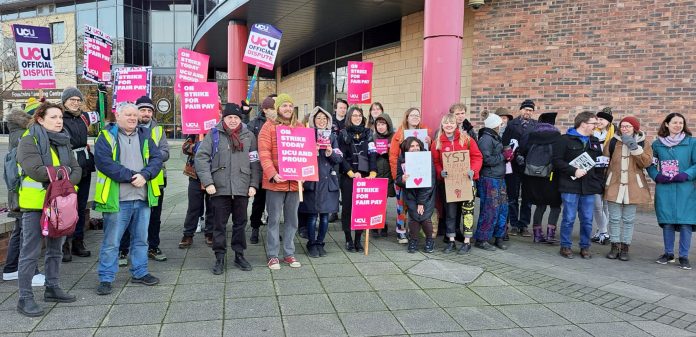Bea Gardner, UCU member
The long-running University and College Union (UCU) dispute over pay and conditions in universities – now entering its fourth academic year – is at a critical juncture.
As demanded by Tory anti-union laws, a reballot is taking place, running from 19 September until 3 November, despite conference having mandated the union’s leadership to organise a strike reballot to run through the summer period.
National strike dates are set to begin on 25 September for five days, immediately before the current mandate expires on 30 September. However, with some branch leaderships outwardly stating they would not be participating, the union’s Higher Education Committee (HEC) voted to permit branches to opt out of the action. This has effectively triggered a collapse of the nationwide character of the strike action.
In addition, earlier this month, the marking and assessment boycott (MAB) was ended, with 60% of members voting to end it.
This does not mean that members aren’t prepared to fight on the issues of pay, casualisation and workload. There is a deep anger among university workers, reflected in the extensive action that has been taken in the last year. Action which has been spearheaded by determined branch activists overcoming Tory anti-trade union laws, even without a fighting lead from the union’s general secretary Jo Grady.
Instead, as the MAB progressed, there was a feeling among some members of “why would I expose myself to more pay deductions when the mandate is set to run out and I will have to mark the work anyway”. The imminent end to the strike mandate with no clear plan ahead has similarly risked members being unclear where the dispute is going.
Member experiences of the MAB vary, reflecting differences in university responses to the boycott as well as varying degrees of organisation across branches. Outrageously, thousands of members faced significant pay deductions since the MAB began in April, despite continuing to carry out other work duties. Punitive deductions varied by institution – some were deducted one month’s pay, and others 50% for a period of five months.
Different UCU branches responded with action on an individual basis, but this was not planned and coordinated by the union’s leadership nationally. Workers at Leeds University ended three weeks of indefinite action in June after bosses reduced the severity of sanctions, for example.
The deliberate delays and inaction by Grady and a layer of full-time officers have jeopardised the action throughout. For example, Grady ‘paused’ the dispute in February and undemocratically suspended a whole calendar of significant escalating strikes without consultation with the elected lay leadership and negotiators. Ultimately, the pressure from members has kept the dispute alive.
An escalating programme of action, which puts significant pressure on university bosses – together with confidence that the union’s leadership will follow through with action – is needed to win a renewed strike mandate. It also needs thorough preparation, including a comprehensive strike fund to assist those who have faced significant hardship through previous action and bosses’ punitive sanctions.
The union’s industrial campaign also has to have with it a political campaign to address the crisis in university funding. A small number of institutions hold vast reserves, and others face severe financial insecurity. Across the board, as workers’ pay and conditions are squeezed, larger and larger student numbers are crammed into lecture theatres to bring in cash.
Labour leader Sir Keir Starmer has ditched his 2020 election pledge, carried over from Jeremy Corbyn’s time as leader, to scrap tuition fees. A general election is around the corner. What force is going to be standing for fully funded free education?
Why isn’t UCU demanding of Starmer a commitment to end marketisation and fully fund higher education? UCU, with other unions, could prepare and back a union-backed list of candidates who do stand for that and other socialist policies in the interests of their members.







